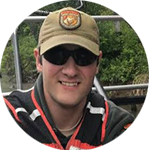"Identifying living things is one of my greatest passions."
Aaron Callis's Bio

Major
Natural Resources & Wildlife TechnologyOccupation
Wildlife ManagerWhy GC for Aaron?
- Grew up being familiar with Garrett College
- GC's affordability was the biggest deciding factor for him in choosing a college
- His passion is the outdoors - GC's NRWT program was a natural fit
- Thrived in a supportive environment and personalized attention from professors
A lifelong resident of Garrett County, Aaron Callis grew up being familiar with Garrett College.
A 2010 graduate of Southern Garrett High School, Garrett's affordability was perhaps the biggest deciding factor for him when it came to choosing a college.
Today, Callis is employed as a wildlife manager for the Aquatic Community Assessment and Restoration Program (ACARP) at the West Virginia Division of Natural Resources, located in Elkins, W.Va.
As a wildlife manager, he takes part in equipment inventory, maintenance, and ‘sorting fish' – which involves collecting and analyzing fish specimens obtained from a stream survey and identifying them to the appropriate species.
Later this year, he will be doing field surveys in streams throughout the state of West Virginia.
"What I enjoy most about my job is getting to apply and hone my skills as a taxonomist," said Callis. "Identifying living things is one of my greatest passions."
According to Callis, a lot of what he has learned and the skills he has gained can be attributed to Garrett College's Natural Resources and Wildlife Technology (NRWT) program.
The NRWT program helped me to learn how to properly study living things in the field, organize my knowledge, and acquire foundational knowledge and skills that I could build upon in my career," Callis explained. "Garrett College gave me the encouragement I needed to pursue a career that genuinely interested me."
As a student, Callis enrolled in Neotropical Natural History, one of many NRWT courses, that took place in the rainforests of Central America, led by Peter Skylstad, GC's professor of biology and one of the instructors of the NRWT program.
Over the past 12 years, more than 100 students, like Callis, have taken the class.
"Aaron was one of those students that was very curious about the natural world," stated Skylstad. "He was like a kid in a candy store as he trekked through the jungle, observing rare birds, amphibians and reptiles like the juvenile spectacled caiman pictured in the photo."
Callis noted how appreciative he is of the amount of ongoing support he received from GC professors and faculty, as a student.
"I am thankful for my former advisors and professors – Kevin Dodge and Peter Skylstad – for being so supportive to me and all of their students," he said. "Professors Jim Allen and Linda Griffith were also instrumental and supportive in lending me their help when I struggled in their classes."
According to Skylstad, Aaron's intense curiosity is one of the essential characteristics in a student that leads to success, both in the NRWT program and in a career in natural science.
"Aaron's innate curiosity made it easy for NRWT program professors to inspire him to learn and to succeed," remarked Skylstad. "I credit his mother for fostering and supporting him as he pursued his degree. She made it possible for Aaron to reach for the stars! I'm not surprised that Aaron has been successful --- he worked hard, never gave up, and has become a lifelong student of nature."
Callis graduated with his associate of applied science degree in Natural Resources and Wildlife Technology and immediately transferred to California University of Pennsylvania to earn his bachelor of science degree in environmental studies, with a concentration in fisheries and wildlife.
Students enrolled in Garrett College's NRWT program benefit from practical, field-based instruction and hands-on classes, most of which contain an outdoor component.
Garrett's program allows students to learn and manage wildlife habitats, sample fish populations, survey timber, map plant and animal communities, monitor rare plant and animal species, restore eroded stream banks and degraded wetlands, and help children learn about nature – all in a small class size environment between students and the instructors.






